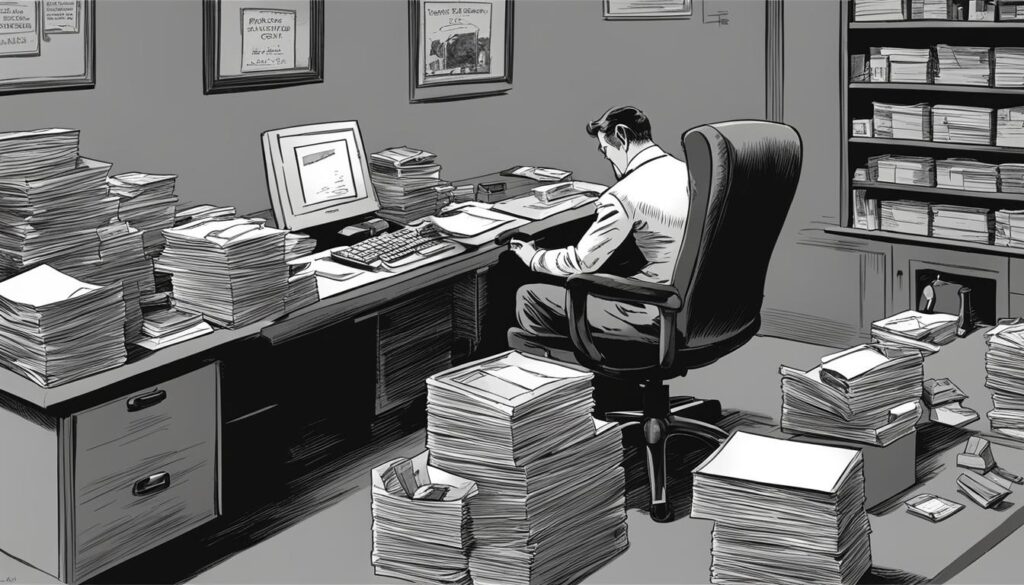When someone leaves a company, it can be challenging to find the right words to express their departure. As a wordsmith, I believe in the power of language to convey emotions and transitions. In this article, I will guide you through the poetic dance of alternative expressions for the phrase “no longer with the company.” Together, we will explore eloquent ways to communicate a professional departure, leaving the mundane behind.
Key Takeaways
- Discover graceful alternatives to “no longer with the company.”
- Master the art of conveying professional departures with elegance.
- Embrace creativity and poetic language in business communication.
- Learn formal and informal expressions to suit different contexts.
- Leave a lasting impression with your farewell messages.
No Longer Working With Us (Formal)
When it comes to conveying a formal departure, a phrase that perfectly captures the essence is “no longer working with us.” This expression is commonly used in official emails and company announcements to inform colleagues about someone’s resignation. Not only does it deliver clarity and professionalism, but it also ensures that the departure is addressed appropriately and respectfully.
Picture this: I send out an email to my team, letting them know about a colleague’s departure. With a heavy heart, I begin crafting the email, ensuring that I strike the right tone. I write,
Dear Team,
I wanted to inform you that [Colleague’s Name] is no longer working with us. [He/She] has made the decision to move on to new opportunities, and we wish [him/her] all the best in [his/her] future endeavors.
[Colleague’s Name] has been a valuable member of our team, [contributing to/bringing] [specific accomplishments/skills] during [his/her] time with us. We truly appreciate [his/her] dedication and hard work, and we will miss [him/her] greatly.
Please join me in thanking [Colleague’s Name] for [his/her] contributions and wishing [him/her] every success in [his/her] future endeavors.
Best regards,
[Your Name]
As you can see, by using the phrase “no longer working with us,” I am able to accurately convey the departure in a formal and respectful manner. The focus remains on acknowledging the colleague’s contributions while also expressing well-wishes for their future.
| Benefits of Using “No Longer Working With Us” | Drawbacks of Using “No Longer Working With Us” |
|---|---|
|
|
Doesn’t Work Here (Informal)
If you’re looking for a more casual and friendly way to talk about someone no longer working with the company, you can simply say, “doesn’t work here.” This informal phrase is commonly used when chatting with colleagues whom you have a close relationship with. It’s a great choice for casual conversations or when discussing previous employees with coworkers.
When using this phrase, you can convey a business farewell in a cordial and lighthearted manner. It adds a personal touch to the conversation while still maintaining a sense of professionalism.
“Hey, have you heard from Jessica? She doesn’t work here anymore.”
This phrase is best used when you want to keep the conversation informal, such as during team lunches or after-work gatherings. It creates a comfortable atmosphere and allows for a more relaxed exchange among colleagues.
When it comes to business farewells, a cordial goodbye can make a lasting impression. Saying “doesn’t work here” in an informal setting is a friendly and concise way to acknowledge someone’s departure, showing that their time at the company is valued and remembered.
Key Points:
- “Doesn’t work here” is an informal phrase used to talk about someone no longer employed by the company.
- It is best used in casual conversations with colleagues.
- This phrase adds a personal touch to the conversation and creates a sense of camaraderie.
- Using a cordial goodbye is essential in maintaining professional relationships.
Remember to choose your words carefully, as the way you communicate someone’s departure can have a lasting impact on your workplace relationships. Even in an informal context, it’s important to maintain professionalism and respect when discussing previous employees.
Is No Longer Employed
When it comes to bidding farewell to a valued team member, expressing their departure with grace and professionalism is paramount. One way to tactfully communicate their corporate exit is by saying that they are no longer employed. This simple phrase can be used in various contexts, such as emails, conversations, or official announcements, to indicate that the individual has officially parted ways with the company.
Choosing this elegant expression of professional separation allows for a formal farewell without delving into specific details regarding the reasons for the departure. It not only respects the employee’s privacy but also acknowledges their contributions, recognising the end of their tenure without unnecessary explanation.
By using the phrase “is no longer employed” in email communications, individuals can convey the organizational change in a formal and respectful manner. This approach ensures a subtle yet effective way of informing colleagues, clients, or stakeholders about the individual’s departure and the need for adjustments within the corporate structure. Ultimately, this phrase serves as a respectful farewell, paving the way for new beginnings and further professional growth.
“Farewell is not just a word; it’s a symphony of memories woven into the tapestry of our professional journey. As I look back on our shared experiences, I want to express my deepest gratitude for your dedication and expertise. It is with a heavy heart that I inform you that [Employee Name] is no longer employed with our company.”
| Benefits | Considerations |
|---|---|
|
|
With the phrase “is no longer employed,” individuals can navigate the delicate terrain of professional separation while honoring the employee’s contributions. This formal farewell sets the stage for a graceful exit, while also allowing both parties to move forward with mutual respect and the promise of new opportunities.
Is No Longer With the Company
When bidding farewell to a colleague in a formal and professional manner, one of the phrases that gracefully conveys their departure is “is no longer with the company.” This eloquent expression is commonly used in formal emails or announcements to inform a group of individuals about an official corporate exit. With its refined tone, it aids in maintaining a sense of professionalism during the transition.
Sharing this news with sensitivity and respect is crucial, ensuring that the departure is conveyed appropriately. By using the phrase “is no longer with the company,” the business farewell becomes a formal farewell. It embodies the spirit of a cordial goodbye while upholding the dignity and warmth that should accompany such announcements. The departure is honored and recognized, allowing everyone to navigate the change in a dignified manner.
“Let us bid our dear colleague farewell as we announce that they are no longer with the company. Their dedication and contributions will be forever cherished, and we wish them the utmost success in their future endeavors.”
Using this phrase in an email can be as simple as:
“Dear Team,
I hope this email finds you well. I wanted to inform you that [Name], our esteemed colleague, is no longer with the company. We extend our gratitude for [his/her] valuable contributions and wish [him/her] all the best in [his/her] future endeavors.
Warm regards,
[Your Name]”
By utilizing this polished phrase, we elevate the corporate exit to a level of formality befitting the individual’s departure. It establishes an atmosphere of respect and appreciation, allowing for a smooth transition and fostering a culture of professionalism within the organization.
No Longer a Part of the Company
As I bid farewell to my time here, I find solace in the phrase “no longer a part of the company.” It captures the essence of my formal goodbye, marking my official departure from this chapter of my life. Just as the wind carries whispers of change, I too embark on new ventures, leaving behind memories woven into the fabric of this business.
“No longer a part of the company” – an elegantly crafted phrase that delicately conveys the essence of my business farewell. It is with gratitude that I depart, cherishing the moments we shared, the lessons learned, and the connections forged. As I step away, I carry with me the invaluable experiences that have shaped my journey.”
In the tapestry of life, our paths intertwine, but each thread has its end. With this formal departure, I embrace the uncertainty of the future while embracing the lessons learned from this time spent here. Though I am no longer part of the team, the memories linger, acting as a testament to the experiences we shared and the growth we fostered.
As I embark on new horizons, I wish to express my deepest gratitude to all those who have contributed to my professional journey. Your support, guidance, and camaraderie have been instrumental in shaping the person I am today. It is with a sense of hope and excitement that I bid adieu, carrying with me the friendships made and the wisdom gained.
Just as the seasons change, so too must we adapt to the shifting tides of life’s journey. The phrase “no longer a part of the company” marks a turning point, signaling the end of one era and the dawn of another. With eyes set on the future, I embrace the challenges and opportunities that lie ahead, grateful for the experiences that have brought me here.
| Pros | Cons |
|---|---|
| The phrase conveys a sense of respect for the company and colleagues. | May lead to questions or curiosity from colleagues about the departure. |
| Allows for a formal and professional farewell. | Could be seen as impersonal or cold by some. |
| Leaves room for interpretation, avoiding specific details about the departure. | May require additional explanation when conveying the news to clients or external stakeholders. |
As I take my leave, let the memories we’ve woven together serve as a beacon of inspiration. Though I am no longer a part of the company, my journey continues, intertwining with the lives of new colleagues and collaborators. With a formal goodbye, I step into the unknown, grateful for the opportunities that have shaped my time here and eagerly embracing the possibilities that await.
Does Not Work Here Anymore
Just as the seasons change and the wind whispers through the trees, there are times when the familiar faces we once knew no longer grace the halls of our beloved company. It is with a touch of sadness and a glimmer of hope that I share the phrase “does not work here anymore.”
This elegant expression serves as a gentle farewell, resonating with both grace and professionalism. When speaking to colleagues who are familiar with the individual’s journey, this phrase reminds us of the cordial goodbyes we bid to those who have embarked on new beginnings.
“Goodbyes are not forever. Goodbyes are not the end. They simply mean I’ll miss you until we meet again.”
Although simple in words, this phrase encapsulates the bittersweet essence of a departure. It conveys that the person in question has taken their talents elsewhere, leaving behind memories and legacies that shape the path we walk upon. It can be used in professional emails, addressing not only the comrades who remain but also the valued clients who may wonder about the individual’s whereabouts.
And so, as we bid adieu to those who have chosen a different destiny, let us remember that the echoes of their presence will linger within these walls. They have left an indelible mark on the tapestry of our professional lives, weaving stories of resilience, growth, and inspiration.
Let us embrace the cordial goodbye, each farewell a reminder that life moves ever forward, carrying us to new horizons that await our footsteps. The departure of one is but an invitation for others to step into the spotlight, to continue the dance of business with passion and determination. As we say goodbye to our dear colleague, let us welcome the possibilities that lie ahead, for it is in the ebb and flow of change that we find the beauty of growth and progression.
No Longer Works With Us
When bidding farewell to a colleague through email, it can be challenging to find the right words to convey their departure respectfully and elegantly. In such cases, using the phrase “no longer works with us” proves to be an appropriate choice. By opting for this expression, we can communicate that the person has either resigned or been terminated, ensuring transparency within the workplace and informing colleagues of the change occurring in our organization.
“Dear Team,
I wanted to inform you that [Colleague’s Name] no longer works with us.
Please join me in extending our gratitude for their contributions and wish them success in their future endeavors.
Regards,
[Your Name]”
By using the phrase “no longer works with us,” we maintain a cordial and professional tone, allowing for a polite business farewell. This expression indicatesthat the person has moved on to new opportunities and helps foster a positive environment during transitions within our organization.
Has Moved to a New Job
When one decides to bid farewell to their current professional journey and embrace a new chapter, we honor their choice by saying, “has moved to a new job.” This eloquent phrase conveys that the person has discovered an exciting employment opportunity elsewhere and has graciously departed from their previous corporate path. By acknowledging their decision with respect, we show our appreciation for their contributions and create a sense of goodwill.
In the context of business farewells, “has moved to a new job” serves as a dignified way to communicate the professional separation to both customers and colleagues. This phrase symbolizes the departure as a corporate exit, as the individual transitions into a new role, seeking fresh challenges and prospects. It reminds us all that the ever-changing landscape of the business world is brimming with opportunities for personal and career growth.
“Like a bird soaring towards new horizons, [Employee Name] has spread their wings and embarked on a new journey, leaving our company to embrace an exciting new job. We extend our heartfelt gratitude for their dedication and professionalism, and we wish them nothing but success in their future endeavors.”
By incorporating “has moved to a new job” into our vocabulary when parting ways with a valued team member, we demonstrate our understanding and support for their aspirations. This phrase encapsulates the essence of corporate exit, acting as a formal farewell that acknowledges the professional separation while honoring their triumphs.
When we bid adieu to someone who has embarked on a new employment adventure, we inspire a sense of camaraderie and celebrate the next chapter in their career. Let us embrace the power of positivity and wish them well as they embark on their exciting new journey.
| Advantages | Disadvantages |
|---|---|
| A fresh start in a new work environment | Loss of familiar colleagues and routines |
| Opportunity for career growth and advancement | Adjustment period in a different organizational culture |
| Expanding professional network | Learning new job responsibilities and processes |
| Exploring new industry challenges and opportunities | Leaving behind established working relationships |
Conclusion
In the realm of professional departures, there exist numerous ways to bid farewell to someone no longer with the company. These alternative phrases offer a graceful and sophisticated means to signify the transition into a new chapter of one’s career. Whether engaging in formal or informal settings, the importance of selecting the right words cannot be overstated when conveying a professional departure with poise and professionalism.
From the formal realms of business farewells to cordial goodbyes, the options are plentiful to achieve a respectful and dignified separation. When it comes to professional resignations and corporate exits, using phrases such as “no longer working with us” or “is no longer employed” can effectively communicate an official departure without divulging too many details.
Alternatively, in a more informal context, expressions like “doesn’t work here” or “does not work here anymore” can foster a cordial farewell with colleagues who share a close bond. Furthermore, when someone moves on to new avenues, the phrase “has moved to a new job” showcases their professional separation without undermining their decision or achievements.
In summary, traversing the realms of professional departure necessitates thoughtfulness in word choice. By employing these various phrases, one can engage in a formal goodbye, a business farewell, or a formal farewell that gracefully acknowledges the next chapter while upholding the values of professionalism and respect.
FAQ
How can I formally announce someone’s departure from the company?
One way to formally announce someone’s departure is by saying “no longer working with us.”
In what situations is it appropriate to say “doesn’t work here”?
You can use “doesn’t work here” in more informal and casual settings when addressing close colleagues.
When should I use the phrase “is no longer employed”?
“Is no longer employed” is suitable for emails or conversations when you want to indicate someone’s departure without providing specific details.
How can I professionally convey someone’s departure in an email or announcement?
To maintain a professional tone, you can use the phrase “is no longer with the company.”
What is a suitable phrase to announce that someone is no longer part of the company?
“No longer a part of the company” is a good phrase to use when addressing other employees who worked with the individual.
When can I say someone “does not work here anymore”?
“Does not work here anymore” is appropriate for professional emails when addressing colleagues who are familiar with the individual.
How can I inform colleagues that someone has either resigned or been fired?
You can say “no longer works with us” to transparently communicate someone’s departure within the company.
How can I express that someone has moved on to a new job?
Use the phrase “has moved to a new job” to indicate that the person has found employment elsewhere and chosen to leave their current company.
What are some alternative ways to say “no longer with the company”?
The alternatives include “no longer working with us,” “doesn’t work here,” “is no longer employed,” and “no longer a part of the company,” among others.
Source Links
- https://englishrecap.com/professional-ways-to-say-someone-left-the-company/
- https://wordselector.com/other-ways-to-say-no-longer-with-the-company/
- https://responsefully.com/other-ways-to-say-someone-is-no-longer-with-the-company/













